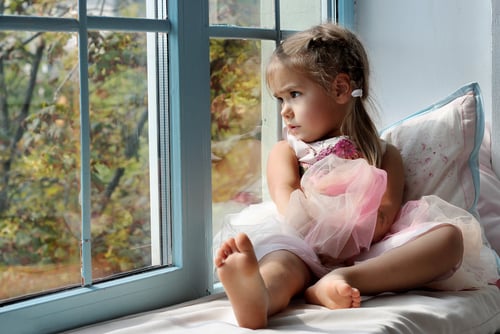Emotional detachment is a tricky issue, as it can have beneficial effects or present a serious challenge in your emotional life and relationships with other people. The useful role of emotional detachment can, for example, help health workers do their jobs calmly and with the focus that would be impossible if they were overwhelmed by emotions. Aside from being beneficial for others, it also serves a self-protective function by allowing them to distance themselves from traumatic experiences, which is significant for maintaining their well-being.
As this example shows, emotional detachment stems from the need to protect oneself from negative emotions or experiences. Childhood trauma is undoubtedly one such experience, particularly in the case of childhood abuse or neglect. The variety of events that can cause traumatic experiences in childhood is quite wide. They can lead to different outcomes as the child grows into an adult with unresolved feelings.
One of the severe outcomes is emotional detachment disorder, which can be treated in different ways. It can be a generalized pattern of behavior or a singled-out occurrence as a result of a specific situation. In case of a chronic occurrence, the matter of how to fix emotional detachment becomes something that might need to be explored more thoroughly.
Is Emotional Detachment A Trauma Response?
It’s possible and quite common for emotional detachment to develop as a response to childhood neglect, abuse, or any other type of trauma. It serves the purpose of protecting oneself from intense and overwhelming emotions children aren’t equipped to deal with. A mixture of fear, shame, secretiveness, and the desire to please the abuser and deserve their love and approval can be impossibly confusing for a child.
Children find ways to disconnect from overwhelming emotions, even in cases of other types of traumatic experiences, when there’s no abuse involved. Over time, this pattern of suppressing emotions develops into a chronic coping strategy that develops as the child grows up into an adult. Now they face other types of experiences that trigger those or similar emotions. Still, their coping strategy has solidified over time and persists through adulthood, complicating their relationship with people and themselves.
Signs of emotional detachment in adults usually include:
- Problems maintaining healthy relationships.
- Having difficulty being honest and open about your feelings.
- Not being a “good listener.”
- Avoiding or craving any type of intimate contact: verbal, physical, or sexual.
- Having low self-esteem
- Being ambivalent about relationships with people and important life decisions.
- Substance abuse as a way to escape reality.

Is Emotional Detachment A Form Of Dissociation?
Even though emotional detachment and dissociation have similar manifestations and are in some ways related, these are two distinct concepts. Dissociation refers to a disconnection between one’s thoughts and emotions and the outside world they’re experiencing. For some people, these disconnections can be mild and temporary and could be compared to daydreaming. However, in more severe cases, they can be long-lasting and, if not addressed, lead to dissociative identity disorder that requires professional help.
Dissociation can be triggered by highly stressful events and traumas, resulting in detachment from oneself or reality. Emotional detachment, similarly, is an attempt to avoid or suppress certain emotions. However, while emotional detachment is usually viewed as a coping mechanism, dissociation is a more severe symptom of trauma or other stress-related disorders. Another difference is that emotional detachment generally involves awareness of one’s emotions, while dissociation is unconscious disconnection from the sense of self, environment, and reality.
Emotional detachment can also be a symptom of certain mental health conditions, most commonly:
- Post-traumatic stress disorder (PTSD).
- Depression.
- Personality disorders.
Do Childhood Traumas Affect The Development Of Reaction Formation?
Reaction formation is a defense mechanism that involves behaving in a way opposite to one’s true feelings or impulses, and it’s often used as a coping mechanism to deal with conflicting emotions. It occurs when a person feels a strong urge to act in a certain way but then behaves opposite to their unconscious desires. Reaction formation is presumed to appear as a way of dealing with conflicting emotions and reducing anxiety. By acting in a way that’s opposite to their true desires, individuals avoid the discomfort of confronting their true feelings and thoughts.
The connection between childhood trauma and reaction formation certainly exists. However, childhood trauma can have many different forms and levels of severity. It can include severe physical, sexual, and emotional abuse or witnessing violence or trauma. Neglect and abandonment can also cause prolonged traumatic experiences for young children. Depending on the type, severity, duration, or frequency of exposure to trauma, a child can respond in different ways and form other coping mechanisms.
Children lack the ability to manage intense emotions like fear, helplessness, or anger that generally emerge when they experience any type of trauma. One of the ways they can get through these emotions is by developing reaction formation. A typical example of reaction formation due to childhood trauma would be behaving coldly and distantly in interpersonal relationships because of feelings of shame and vulnerability stemming from unfulfilled needs for love and attention. This is how childhood neglect can directly influence the development of reaction formation.
An opposite example would be the case of childhood abuse. A child might feel the desire for revenge or retaliation stifled by fear or powerlessness. To cope with these conflicting emotions, a reaction formation of excessive obedience toward the abuser can be formed. Although this type of behavior goes against their true desires, it becomes a coping mechanism to deal with difficult emotions and suppress them.

Cope With Emotional Detachment Disorder And Regain A Sense Of Well-Being With PIVOT
Emotional detachment might affect your ability to maintain healthy relationships or cause issues in other aspects of your life. Unfortunately, this means that it doesn’t serve its protective or beneficial role. If you’ve been preoccupied with how to fix emotional detachment, you might benefit from the expert guidance of relationship advocates who can help you identify emotions that are causing you to withdraw from your feelings and miss out on all the good ones by trying to avoid the bad.Emotional detachment is a self-isolation issue, so confronting it in a group setting can be productive. Glass House retreats’ safe and pleasant environment can provide the perfect opportunity to experience togetherness with other five people who want to have healthier relationships. Our retreats are small to give everyone a change to be seen, heard, and helped. Experienced PIVOT coaches guide these workshops to ensure you feel safe every step of the way. They can teach you how to keep yourself grounded in reality. Applying these skills to your relationships and life in general can help you address and satisfy your needs and achieve a sense of well-being.